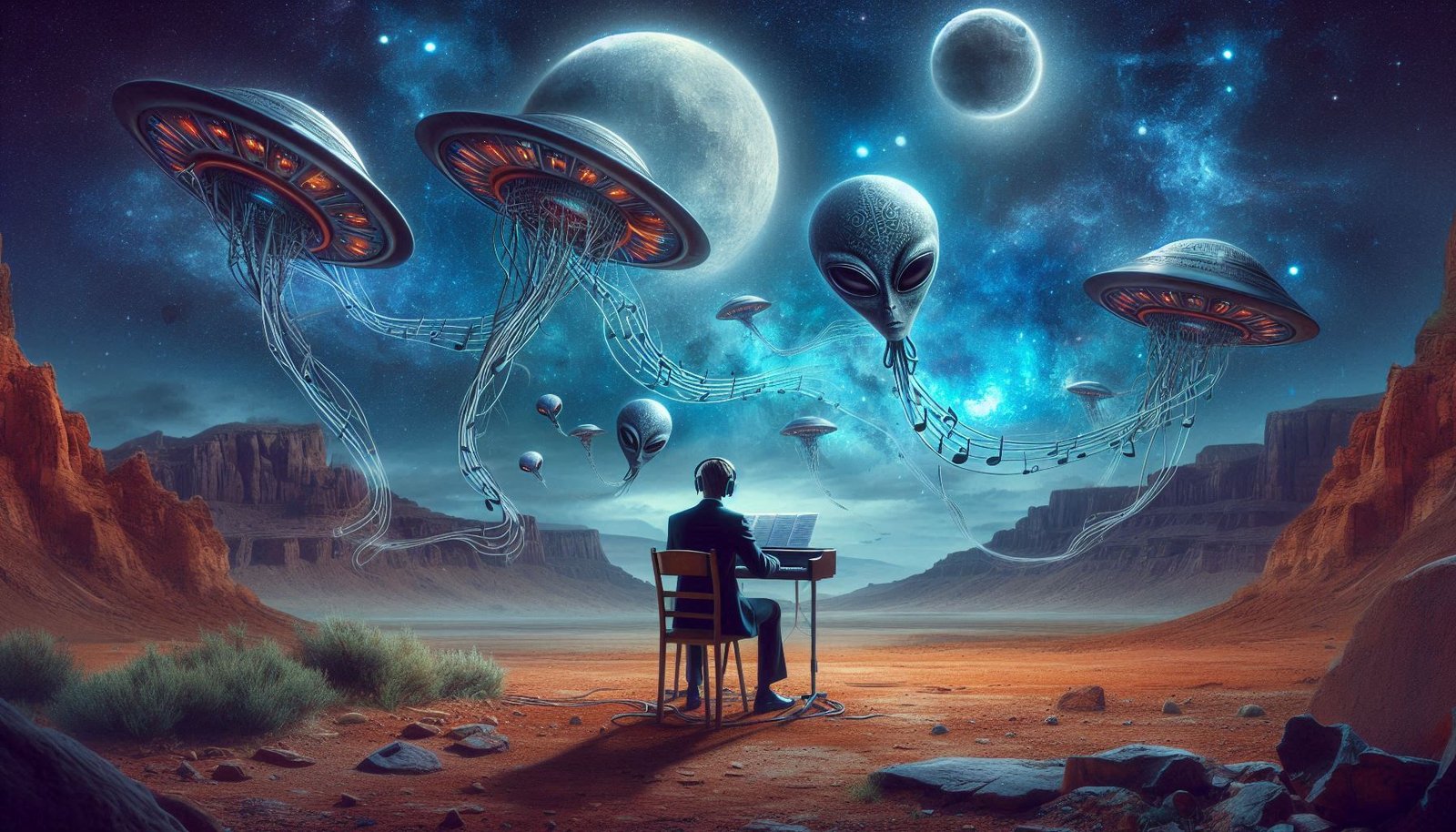
For centuries, humans have looked to the skies and wondered, Are we alone? This curiosity about extraterrestrial life has fueled science fiction novels, blockbuster films, and of course, music. From eerie melodies to futuristic beats, artists have used music to explore the unknown, crafting soundscapes that speculate on what it would be like to encounter life beyond Earth.
In this article, we’ll explore how music has imagined extraterrestrial life, with a journey through different genres, iconic tracks, and the powerful fusion of technology and creativity. Whether you’re a casual listener or a dedicated music lover, you’ll discover how this theme of alien life taps into something universal: our endless fascination with the unknown.
Music as a Portal to Other Worlds
When we think about outer space and aliens, certain sounds come to mind—otherworldly echoes, robotic pulses, and high-pitched synths that seem to come straight out of a sci-fi film. Music has long been a medium for imagining what it might be like to communicate with alien species or explore distant galaxies. From early pioneers of electronic music to today’s boundary-pushing artists, musicians have often used sound as a way to speculate about the future and the possibilities of extraterrestrial life.
One of the earliest examples of this is Sun Ra, the jazz musician whose space-age philosophy and cosmic sound were way ahead of their time. Sun Ra believed he was from Saturn, sent to Earth to bring peace through music. His blend of free jazz and futuristic imagery created a genre-defying sound that still influences artists today. Sun Ra’s music was like an invitation to explore the cosmos—not just through instruments, but through imagination.
Electronic Music: The Sound of the Future?
When we think of “alien music,” electronic genres are usually top of mind. This is because electronic music often sounds like it’s straight out of a sci-fi movie, with robotic beats, synthesized soundscapes, and pulsating rhythms that mimic the unknown.
In the ’70s and ’80s, artists like Kraftwerk and Jean-Michel Jarre took the emerging technology of synthesizers and ran with it, creating music that felt like it was from another planet. With tracks like “Autobahn” and “Oxygène,” these pioneers crafted soundscapes that took listeners on an auditory journey to the future—a future where the lines between humanity and technology blurred, and where extraterrestrial life seemed like a real possibility.
Fast forward to today, and that tradition is still alive and well. Take Grimes, for example. The Canadian artist’s music feels like a transmission from a distant galaxy. Her 2015 album Art Angels has tracks that blend pop with electronic elements, creating a futuristic sound that imagines alien worlds. The song “Venus Fly” feels like a rebellious anthem from another planet, combining heavy synths with dream-like vocals.
Alien Encounters in Hip-Hop and Pop
Hip-hop and pop music have also had their fair share of extraterrestrial themes. One notable example is Lil Wayne‘s “Phone Home,” where he declares, “We are not the same, I am a Martian.” In this track, Wayne uses the alien metaphor to express his uniqueness, his otherness in the rap game. He paints himself as an outsider, someone who is not bound by earthly conventions.
Similarly, OutKast‘s ATLiens album took alien imagery and used it as a metaphor for feeling out of place in society. In the track “ATLiens,” the duo imagines themselves as extraterrestrials navigating a strange and often hostile world, using space metaphors to highlight their feelings of isolation and otherness.
Pop stars, too, have gotten in on the extraterrestrial vibe. Katy Perry‘s hit single “E.T.” from her Teenage Dream album was a massive success, with its hypnotic beat and alien-themed lyrics. Perry describes a love so powerful it feels out of this world, using the alien metaphor to express an overwhelming attraction that transcends human understanding.
Prog Rock and the Cosmic Exploration of Sound
No discussion of alien music would be complete without mentioning progressive rock. Prog rock bands like Pink Floyd, Yes, and Rush have all tapped into themes of space exploration and the unknown, often blending intricate musical compositions with lyrics that dive deep into the cosmos.
David Bowie, of course, is the ultimate rock star when it comes to outer space themes. His alter ego, Ziggy Stardust, was a fictional androgynous alien rock star who came to Earth to deliver a message of hope, only to be destroyed by his fame. Bowie’s 1972 album The Rise and Fall of Ziggy Stardust and the Spiders from Mars remains one of the most iconic concept albums of all time, using the idea of extraterrestrial life to explore themes of fame, isolation, and identity.
In Pink Floyd’s Dark Side of the Moon, the iconic prism cover hints at the infinite possibilities of space, while the album itself is a journey into the unknown realms of the mind and the universe. Tracks like “Eclipse” and “Us and Them” evoke feelings of existential wonder, using the vastness of space as a metaphor for human existence.
The Role of Sci-Fi Films in Alien Music
Sci-fi films have had a massive impact on how musicians imagine extraterrestrial life. One of the most influential soundtracks in this genre is Vangelis‘s score for Blade Runner, a film that explores the nature of humanity in a world filled with androids and futuristic technology. The music combines haunting synthesizers with ethereal sounds, creating a soundtrack that feels both alien and deeply emotional.
John Williams‘s score for Close Encounters of the Third Kind also deserves a mention. The film is centered on humanity’s first contact with aliens, and Williams uses a simple five-note melody to represent communication between humans and extraterrestrials. It’s a brilliant example of how music can be used to imagine how we might communicate with alien life.
More recently, Hans Zimmer‘s score for Interstellar blends traditional orchestral elements with electronic sounds, creating a sense of awe and wonder that mirrors the film’s themes of space travel and time distortion. The music feels alien, but also deeply human, capturing the emotions that come with venturing into the unknown.
Aliens and the Future of Music
As technology continues to evolve, the possibilities for imagining extraterrestrial life in music are endless. With AI-generated music, virtual reality concerts, and new forms of sound synthesis, artists have more tools than ever to create sounds that feel like they’re from another world.
AI is particularly interesting in this regard. Already, we have programs like Amper Music and Aiva that can compose original tracks with little to no human input. As AI technology advances, we could see music that feels truly alien—sounds that are not just inspired by extraterrestrial life, but created by non-human intelligence.
In a way, this brings us full circle. Just as Sun Ra used music to imagine a world beyond Earth, today’s artists are using technology to push the boundaries of what music can be. Whether it’s through AI, synthesizers, or cosmic imagery, music continues to be a powerful tool for exploring the unknown.
Conclusion: Why We’re Drawn to Alien Harmonies
At its core, the fascination with alien life in music is about more than just the possibility of extraterrestrial beings. It’s about curiosity, the human desire to explore the unknown, and the way music can transport us to places beyond our everyday reality. From Sun Ra’s cosmic jazz to Grimes’ futuristic pop, musicians have always used sound as a way to ask big questions: What’s out there? And, What does it mean for us?
As we continue to search the skies for signs of life, it’s likely that music will continue to be a part of that journey. Because if there’s one thing that unites us all—whether we’re human or extraterrestrial—it’s the universal language of sound.
So, whether you’re jamming to Bowie’s Ziggy Stardust, vibing with Lil Wayne’s Martian metaphors, or getting lost in the synth-heavy soundscapes of Grimes, remember: music is our way of imagining what’s beyond the stars. And who knows? Maybe one day, we’ll be singing along with the aliens themselves.


